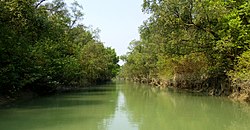Char Fasson (Bengali: চরফ্যাসন) is an upazila of Bhola District in the Division of Barisal, Bangladesh.[1]
Char Fasson Upazila
চরফ্যাসন | |
|---|---|
 Mangroves at Char Kukri-Mukri Wildlife Sanctuary | |
 | |
| Coordinates: 22°11.1′N 90°45.8′E / 22.1850°N 90.7633°E | |
| Country | |
| Division | Barisal |
| District | Bhola |
| Headquarters | Char Fasson |
| Area | |
• Total | 1,106.31 km2 (427.15 sq mi) |
| Population | |
• Total | 518,817 |
| • Density | 470/km2 (1,200/sq mi) |
| • Male | 213,918 [1] |
| • Female | 199,675 [1] |
| Time zone | UTC+6 (BST) |
| Postal code | 8340[3] |
| Muslim | 403,043 [1] |
| Hindu | 10,505 [1] |
| Buddhist | 10 [1] |
| Christian | 15 [1] |
| Others | 20 [1] |
Geography
editChar Fasson Upazila has area of 1106.31 km2, located in between 21°54' and 22°16' north latitudes and in between 90°34' and 90°50' east longitudes. It is bounded by Lalmohan Upazila on the north, Bay of Bengal on the south, Manpura Upazila, Shahbazpur Channel and Bay of Bengal on the east, Dashmina and Galachipa Upazilas on the west.[1] There are more than 100 islands in the upazila. Among them are Char Kukri Mukri, Dhal Char, and Char Nizam.[1]
Demographics
editAs of the 2011 Census of Bangladesh, Char Fasson has a population of 456,437 living in 94,649 households. 128,696 (28.20%) were under 10 years of age. Char Fasson has an average literacy rate of 43.50% (7+ years) and a sex ratio of 996 females per 1000 males. 42,915 (9.92%) of the population lives in urban areas.[4]
According to the 1991 Bangladesh census, Char Fasson had a population of 342,038. Males constituted 51.49% of the population, and females 48.51%. The population aged 18 or over was 148,319. Char Fasson had an average literacy rate of 25.5% (7+ years), compared to the national average of 32.4%.[5]
Arts and culture
editChar Fasson has fifteen clubs, one library, six movie theatres, four theatres and one stadium.[1][5]
Points of interest
edit- Jakob Tower
- Fashion Square, Char Fasson
- Char Kukri Mukri
- Taruya Sea beach
- Charfasson Eid Gah
- Charfasson BM. Town-Hall
- Maya Bridge
- Charfasson Binodon Park
- Betuya launch ghat
- Ministry khamar Bari
- Char Kajur Gachiya
- Dakshin Aicha Thana
- Charfasson Bus Terminal
- Charfasson Samraj Gat
- Five Kopat Gat
- Char Patila
- Char Sondip
Administration
editChar Fasson Thana, now an upazila, was formed in 1970.[1]
The Upazila is divided into Char Fasson Municipality and 19 union parishads: Abubakarpur, Abdullapur, Aminabad, Aslampur, Awajpur, Char Kolmi, Char Madras, Char Manika, Dhal Char, Hazarigonj, Jahanpur, Jinnaghar, Kukri Mukri, Mujib Nagar, Nazrul Nagar, Nilkamal, Nurabad, Rasulpur, and Osmanganj. The union parishads are subdivided into 68 mauzas and 77 villages.[6]
Char Fasson Municipality is subdivided into 9 wards and 9 mahallas.[6]
Religious institutions
editThere are 601 mosques and 5 temples in Char Fasson Upazila.[1][5]
Communication facilities
edit- Roads
- Paved road = 96.80 km
- Semi-paved road = 50 km
- Mud road = 516.32 km.
Education
editThere are eight colleges in the upazila. They include Char Fasson Govt. College, Dular Hat Adarsha Degree College, Fatema Matin Mohila College, founded in 1993,[1] and Rasulpur Degree College.[6]
According to Banglapedia, Charfassion Govt T Barret Model Secondary School, founded 1932, is a notable secondary school in the upazila.[1]
The madrasa education system includes eight Fazil and two Kamil madrasas.[7] According to Banglapedia, Charfassion Karamatia Kamil Madrasah, founded in 1945, is a notable Kamil madrasa and Hazari Gonj Hamidia Fazil Madrasah is a notable Fazil madrasa[1]
Media
edit- Weekly
Fasson Barta (Defunct), Upakul Barta, Pratham Akash.[1]
See also
editReferences
edit- ^ a b c d e f g h i j k l m n o p q Md Harun Rashid Helali (2012). "Char Fasson Upazila". In Sirajul Islam and Ahmed A. Jamal (ed.). Banglapedia: National Encyclopedia of Bangladesh (Second ed.). Asiatic Society of Bangladesh.
- ^ a b Population and Housing Census 2022 - District Report: Bhola (PDF). District Series. Dhaka: Bangladesh Bureau of Statistics. June 2024. ISBN 978-984-475-250-4.
- ^ "Bangladesh Postal Code". Dhaka: Bangladesh Postal Department under the Department of Posts and Telecommunications of the Ministry of Posts, Telecommunications and Information Technology of the People's Republic of Bangladesh. 21 October 2024.
- ^ "Bangladesh Population and Housing Census 2011 Zila Report – Bhola" (PDF). bbs.gov.bd. Bangladesh Bureau of Statistics.
- ^ a b c "Population Census Wing, BBS". Archived from the original on 2005-03-27. Retrieved November 10, 2006.
- ^ a b c "District Statistics 2011: Bhola" (PDF). Bangladesh Bureau of Statistics. Archived from the original (PDF) on 13 November 2014. Retrieved 14 July 2014.
- ^ "List of Institutions". Ministry of Education. Retrieved July 15, 2014.